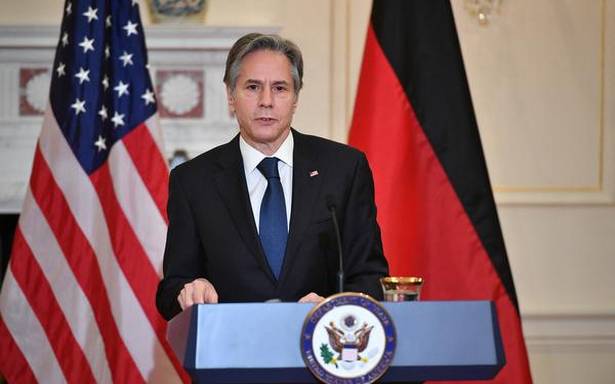Amid tensions with China, Tokyo agrees to continue hosting 50,000 U.S. troops
Japan moved ahead with an expansion of support to U.S. troops as the allies held top-level talks on Friday over tensions with China and North Korea.
U.S. Secretary of State Antony Blinken announced the two nations were signing a five-year extension of the support package provided by Japan for the hosting of around 50,000 U.S. troops on its soil.
The new agreement “will invest greater resources to deepen our military readiness and interoperability”, Mr. Blinken said at the opening of four-way virtual talks between the allies’ foreign and defence chiefs.
“Our allies must not only strengthen the tools we have but also develop new ones,” Mr. Blinken said on Thursday in Washington.
Tokyo pays the costs of the U.S. forces in the country as well as utilities. A previous agreement was set to expire in March 2021, but was extended for a year around a change of administration in Washington.
U.S. Defense Secretary Lloyd Austin, appearing from isolation after a mild case of COVID-19, said the allies were “evolving our roles and missions to reflect Japan’s growing ability to contribute to regional peace and stability”.
Japan renounced its right to wage war after the Second World Warand has since developed a close alliance with Washington, which is treaty-bound to defend the world’s third-largest economy.
According to the Foreign Ministry, the new five-year package will amount to 211 billion yen ($1.8 billion) per fiscal year, an increase of about 5%.
The package comes amid growing tensions with China, which has stepped up incursions near the self-ruling democracy Taiwan.
“Beijing’s provocative actions keep raising tensions across the Taiwan Strait and in the East and South China Sea,” Mr. Blinken said.
He also described North Korea’s missile programmes as an “ongoing threat” after Pyongyang fired a suspected ballistic missile into the sea.
A joint statement issued after the talks took aim at “efforts by China to undermine the rules-based order”, with specific reference to activity in the East and South China Seas.
Source: Read Full Article

